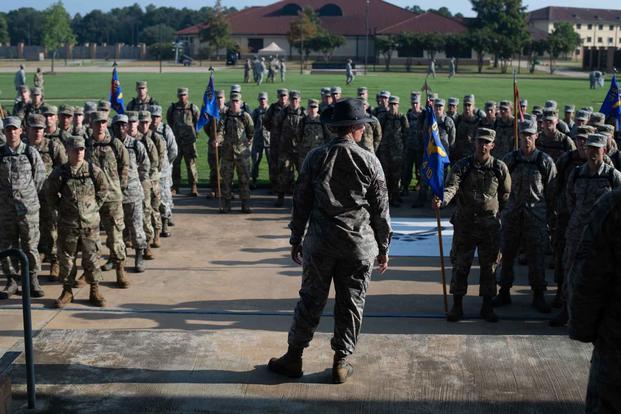
The Air Force is scrambling to overcome a significant shortage in the number of instructors at its only Officer Training School at Maxwell Air Force Base in Alabama and has resorted to pulling staff members back into the field as well as combining classes.
Maj. Nate Roesler, a spokesman for Air University at Maxwell Air Force Base, told Military.com that the school is “currently at 53% of what our production requirement demands” for instructors.
The issue was raised in a September 2022 memo shared with Military.com that said officer training school classes had to be combined in 2023 “due to historically low instructor manning.”
Read Next: Air Force Two-Star Fired Amid Misconduct Investigation
“To mitigate our near-term manpower shortfalls, we consolidated OTS instructors from the two training squadrons, returned some officers from staff positions to line instructor positions, and therefore we were able to maintain an acceptable level of production,” Roesler said.
By pulling in additional people and combining classes, the school was able to maintain its 14:1 student to instructor ratio.
There are multiple factors contributing to the shortage of OTS instructors.
The first is that there simply aren’t enough applicants, as many airmen don’t consider it a coveted position. A 2019 Air Force press release even admitted that “many see instructor duty as a career killer.” That prompted the service to make a change where there was a more intense vetting position for the role and started to include a stint as an instructor as part of officer selection briefs, the summary of an airman’s career used to evaluate them for promotions.
Another factor leading to the shortage is an Air Force-wide problem. As the service scrambles to fill many career fields amid a recruiting crisis, fewer airmen are receiving permanent change of station orders to become OTS instructors with the service desperate to fill a variety of job needs across the force.
“Both the Air Force and Space Force are working through a wide range of force management challenges to ensure we have the right numbers of officers in the right specialties to win a peer fight, and we face the same challenges as the operational Air Force when it comes to filling our positions with a diverse set of talent,” Roesler said.
Being an Air Force OTS instructor is akin to being a military training instructor for the enlisted ranks — training cadets and turning them into leaders, often drilling with them, answering questions and setting the standard for what an ideal officer looks like.
Roesler said the situation will improve slightly with the next permanent change of station cycle this summer, when the school will gain more instructors than it loses, but it will still face an overall shortage.
“While we work through adjustments to how we deliver OTS, we’re working diligently to ensure accurate information is received by potential instructors regarding the nature of instructor duties, the powerful developmental opportunities associated with serving at OTS, and what an amazing opportunity it is to train, develop, and educate the next generation of Air and Space Force officers,” Roesler said.
The August OTS class, which had previously been combined with another course due to the instructor shortage, has now been moved all the way back to October, according to Air University.
Roesler said this change was so staff could pause and take a look at implementing changes to OTS courses “which we are poised to execute beginning in [fiscal year 2024].”
Further details on those changes were not immediately offered by Air University.
The ongoing Air Force’s recruiting crisis could lead to shortages in a wide variety of career fields.
An April 4 email from Air Force Recruiting Service Commander Maj. Gen. Ed Thomas, which was leaked on social media and has been verified as authentic by the service, detailed a dire shortfall in several career fields and predicted nearly 3,000 jobs that could see vacancies.
Thomas estimated that there could be “1,800 empty maintainer jobs, 700 empty defender jobs, 300 in munitions and 100 in fuel” if the recruiting environment doesn’t get better.
“In the coming years, our brothers and sisters in arms will be asked to carry the burden intended for teammates who never joined our team,” Thomas wrote. “Airmen will almost certainly be asked to work longer hours, cover more shifts and make sacrifices in their personal lives to meet the mission demands essential to our national security.”
The service, after barely meeting its active-duty recruiting goals last year, announced in March it was projecting a 10% shortfall for this year. That’s the equivalent of around 5,000 people, nearly the total of all the airmen at the 366th Fighter Wing stationed at Mountain Home Air Force Base, Idaho. It predicted even more shortfalls for the Air Force Reserve and Air National Guard.
The Air Force Recruiting Service has pointed to numerous headwinds that have made it hard to bring in new members: Americans are seeing some of the lowest unemployment rates in more than 50 years, and the Pentagon has released studies showing that only 23% of U.S. youth are eligible to serve right now, due to obesity and other issues.
— Thomas Novelly can be reached at [email protected]. Follow him on Twitter @TomNovelly.
Related: Air Force Offers Easy Specialty Changes to Keep Airmen in Uniform






